I went to Brunei because everybody said it was boring.
I’m aware that’s a weird reason to go somewhere, but I’m a contrarian at heart. If somebody insists a place isn’t worth visiting, I immediately add it to the top of my list and set off in search of its redeeming features.
When I first considered checking out Brunei, I struggled to find many positive write-ups about the sultanate. Everyone declared the country dull. Articles explained it was only worth visiting for a day and that you should only go if you’re into counting countries.
I subsequently gave myself four days to explore — more than most visitors ever consider allocating. I was determined to dig deep, however, and discover worthwhile activities in the country. I like to believe that every place is worth visiting, and I wanted to find what it was that made Brunei special.
My first impressions were excellent.
We had chosen to stay at Taman Mawar Guesthouse because it was the highest-rated guesthouse in the city. (Update 2024: Unfortunately, Taman Mawar has since closed down; I now recommend staying at Capital Residence Suites, which is well-rated and in a decent location).
Previous guests at Taman Mawar had raved about the owner, Maya, writing about how she’d shown them the country — driving them to the sights, taking them out to dinner, and doing everything she could to make their trip wonderful. It turned out she was just as lovely as I’d hoped.
She met us from the airport in the capital, Bandar Seri Begawan, and asked what we loved to do most when we travel.
“Eat!” Dave and I chorused.
“Excellent,” she said with a smile. “I have the perfect place for you.”
Gadong Night Market was the exact opposite to what I pictured when I imagined eating in Brunei, and I loved that Maya had spontaneously chosen to take us there.
Before arriving, my uninformed brain assumed that dining in Brunei meant perching atop solid gold thrones, sampling diamond-infused noodles while a dark plume of petrol gently wafted past my emerald-encrusted table.
A bustling night market, Gadong was filled with both locals and smoke, as vendors barbecued meat and vegetables on skewers, and customers snacked on the offerings. Stalls offered a variety of fruit juices, from orange to rambutan; mango to durian. It was possible to eat here for as little as 1 BND ($0.75). For a country that has a reputation for being over-the-top ostentatious and expensive for visitors, it was fascinating to see a side of it that was the exact opposite.
“Do you want to try something very local?” Maya asked us.
“Always,” I said.
“Well,” she began to laugh. “It’s something that even I don’t eat. I don’t know if you’ll like it. My guests often do not like it.”
“What is it?”
She laughed again, then whispered, “Chicken butt.”
I joined in with her giggles. “Yes,” I told her. “I totally want to try that.”
After all, chicken is chicken is chicken, right? And I always support the decision to use every part of an animal in recipes.
So, how was chicken anus?
It was, um, tubular. It was chicken nugget sized, but there was also this tough, chewy tube in the centre. It wasn’t bad! I 100% know that I am not in any way selling this to anyone, but if you get the chance to sample it at any point, it’s worth having a quick nibble.
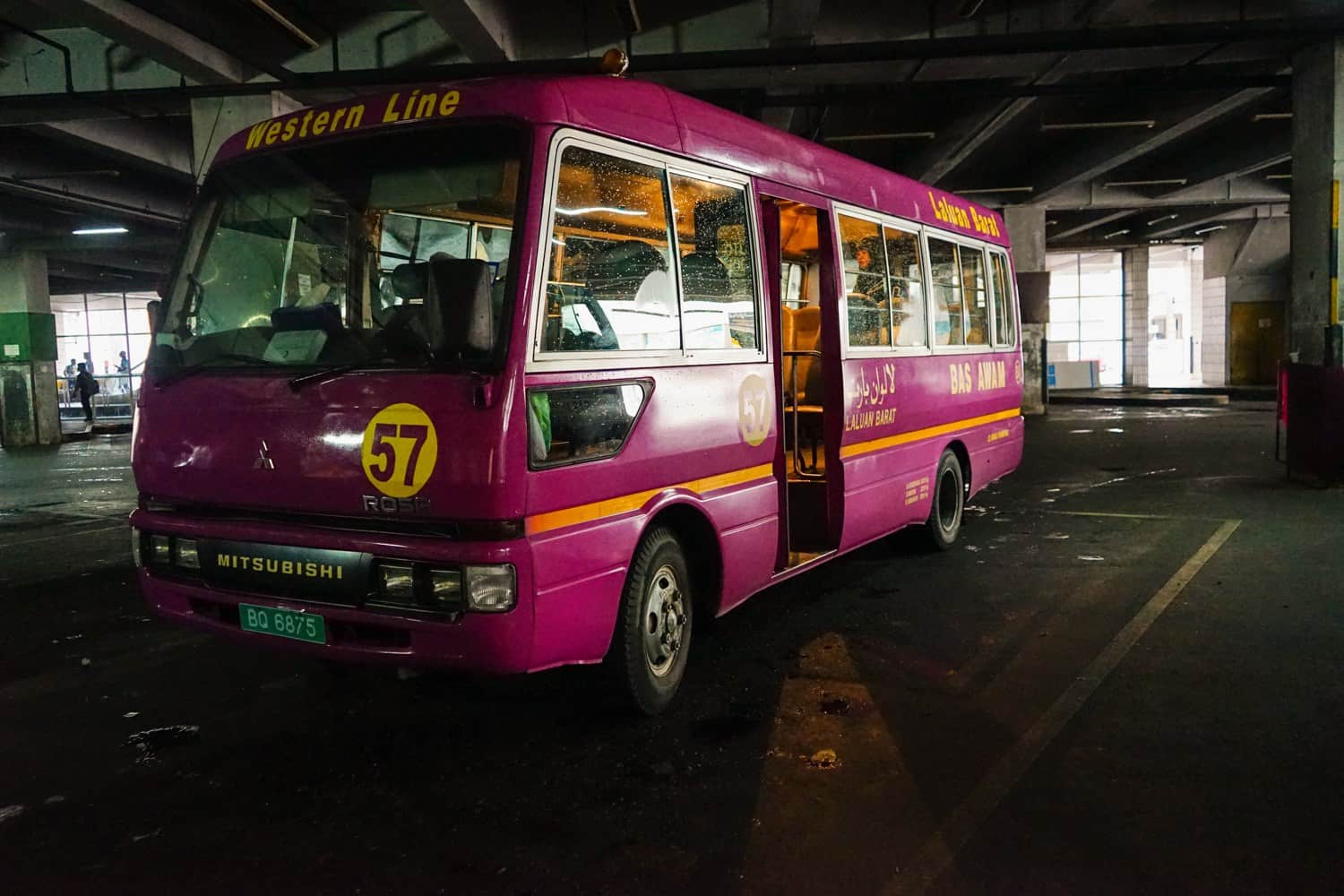
After a wonderful start to our time in Brunei, Dave and I set off the following morning surrounded by bright blue skies. I was thrilled.
A significant number of the photos I had seen of Omar Ali Saifuddien Mosque — the most famous building in the country — depicted it sheltering beneath grey clouds, so I suspected that like many equatorial countries, having a perfect sky was a rarity. Being able to take photos of it on a sunshine-filled day felt like a privilege, and I was practically jogging to get there.
I’ve never been able to warm to any religion, but I have a soft spot for mosques.
And this particular mosque was glam.
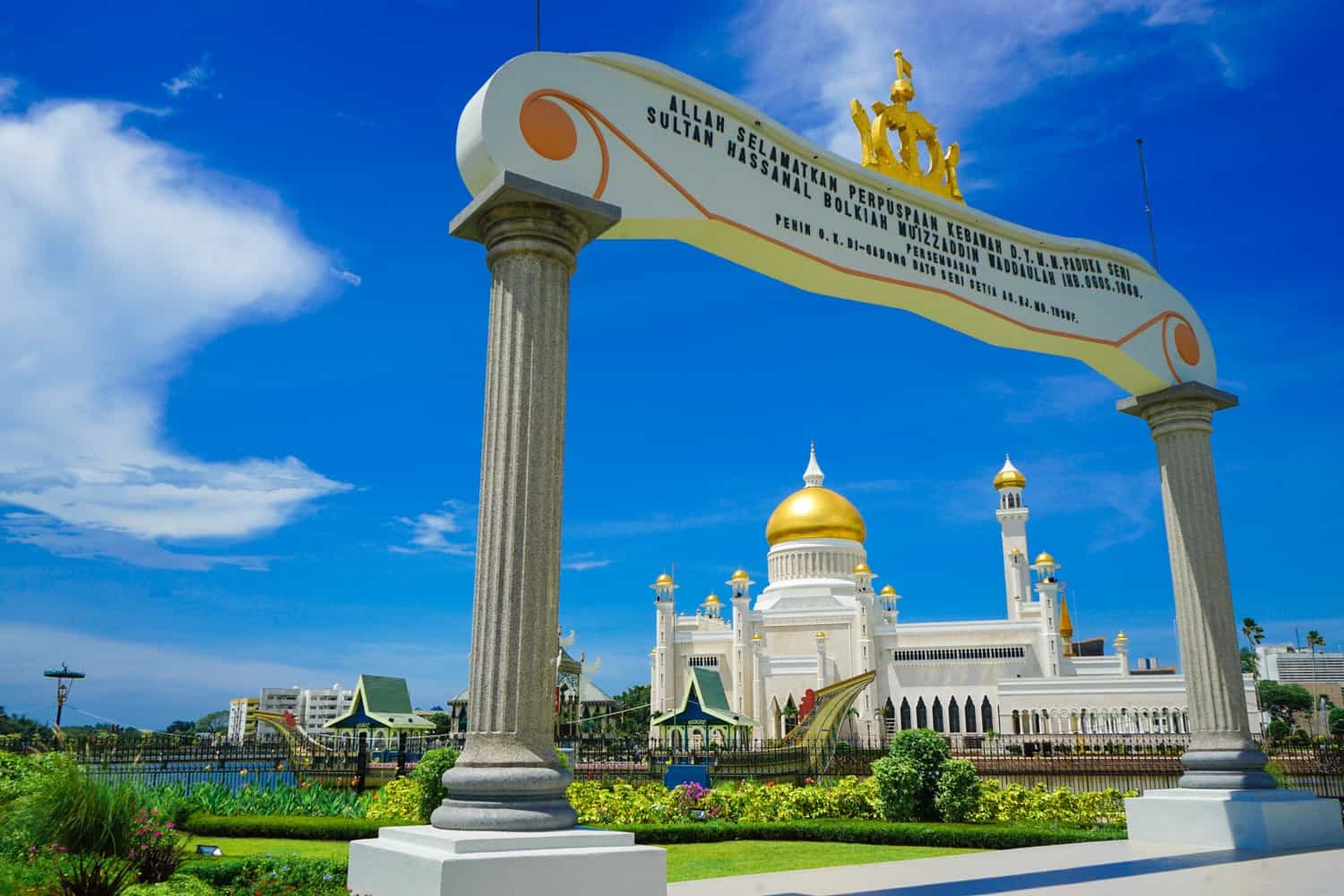
Omar Ali Saifuddien Mosque was built in the 1950s and was named after the 28th sultan of Brunei.
Interestingly, the materials used to build the mosque were sourced from countries around the world: the granite from China, the marble from Italy, the carpets from Saudi Arabia, the timber from the Philippines, and the chandeliers from the U.K. Topping it all off are the sparkling domes that are blanketed in gold leaf.
The mosque is the tallest building in the country, at a not-so-towering height of 53 metres, which gives some indication as to how built-up this capital city is. Answer: not at all.
At one point, the Bank of Brunei built their headquarters higher than the mosque — it didn’t last long, though, as the sultan ordered the top floor of the building to be removed.
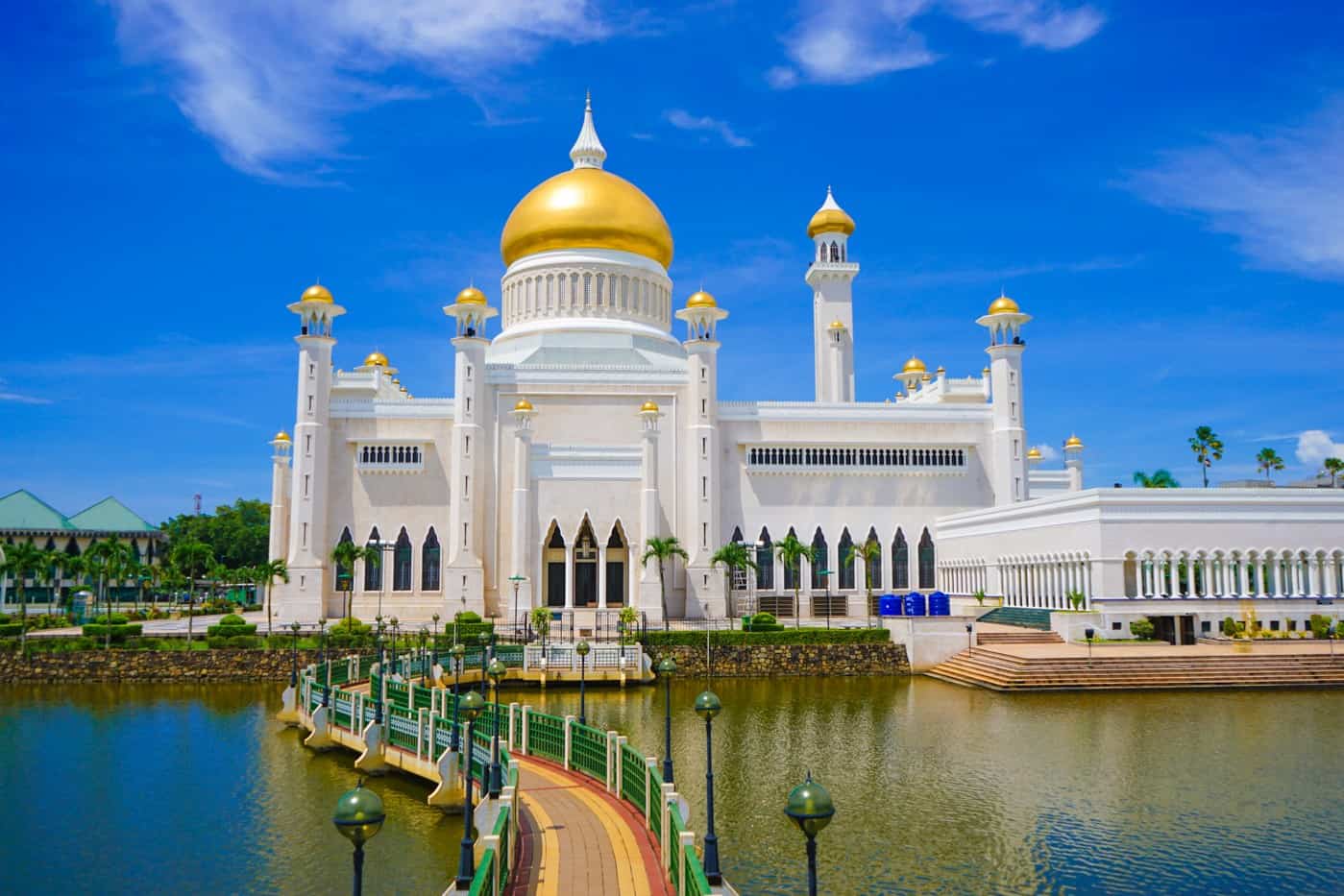
As an appreciator of all things mosque-y, I consider the Omar Ali Saifuddien to be right up there among the most beautiful. In my opinion it doesn’t quite top the Sheik Zayed Mosque in Abu Dhabi, but it was so special nonetheless.
One of the biggest surprises from my time in Brunei was just how few tourists there were. We had this gorgeous mosque all to ourselves for half an hour — if you were to place a building this beautiful in many other countries around the world, you’d be jostling for space with a camera-wielding crowd.
I snapped my dream photos with the blue, almost-cloudless sky and was already convinced that Brunei was worth visiting.
An interesting fact is that everything in Brunei shuts down every Friday between 12 and 2 p.m. to allow residents to pray. But not only that: every building in the country has to be within listening distance of a mosque and public displays of Christmas have been banned within the country. The sale of alcohol is also banned within the country, but non-Muslim visitors can import a reasonable amount if they wish.
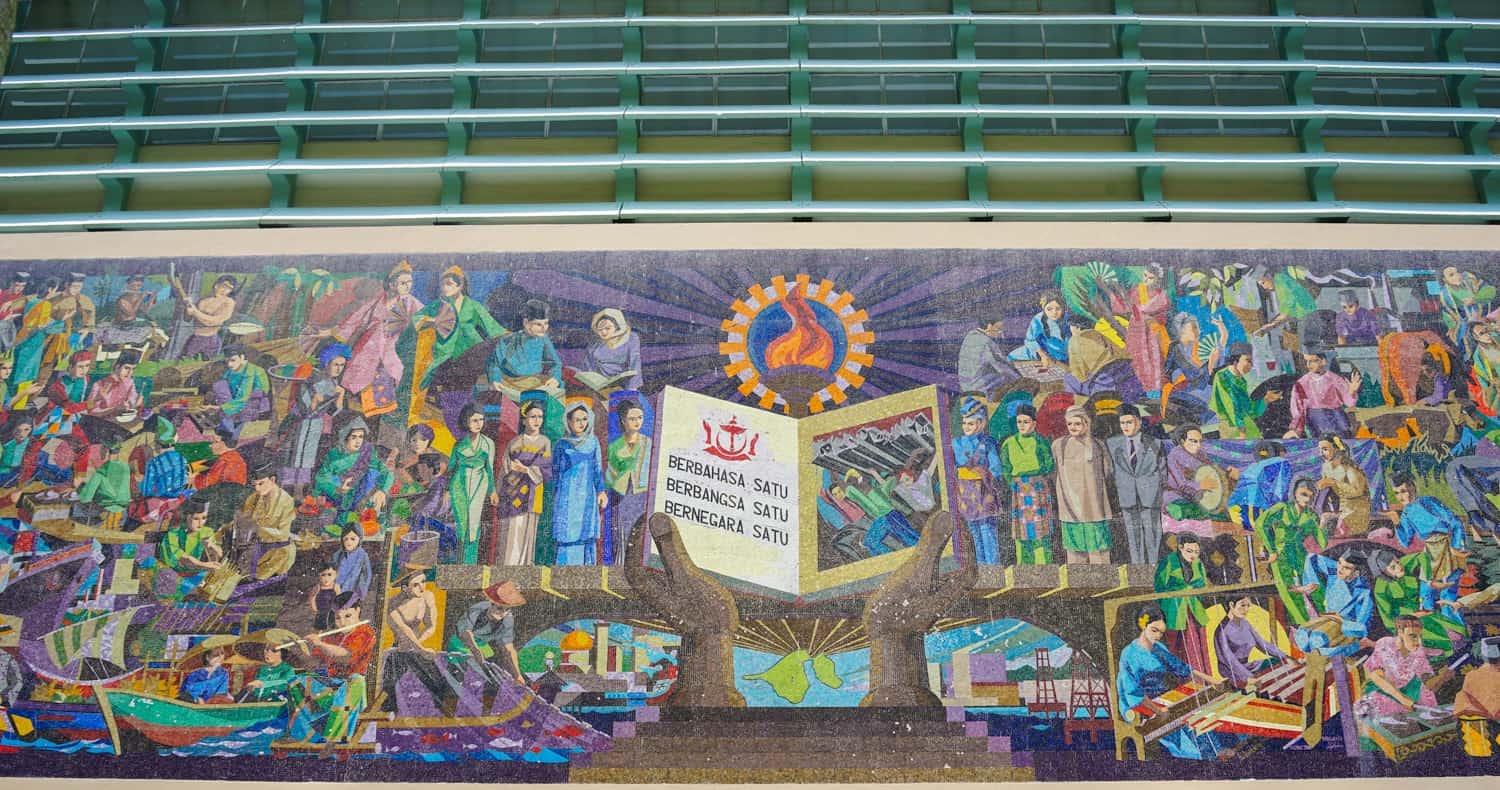
As we searched the streets for somewhere to have lunch, I was struck by how safe the city felt, and how quiet it was for a capital.
Thanks to its vast reserves of oil and gas, Brunei is one of the richest countries in the world, with one of the highest GDPs. You probably already know the sultan is the richest monarch in the world, and he flaunts this wealth shamelessly.
Fun fact: My mum used to work for a bank in her twenties, and one of her tasks was to look after the Sultan of Brunei’s bank account in the U.K. He once invited her to lunch while he was visiting London, but she was too nervous to attend and pretended to be unwell!
In some respects, the sultan does a hell of a lot of good for Brunei. The country doesn’t have personal income tax, sales tax, or VAT, and citizens receive free education, healthcare and pensions, along with access to social housing and cheap loans. I didn’t see a single homeless person in Bandar Seri Begawan and crime rates are very low. Everyone I ran into spoke impeccable English.
Dig a little deeper, though, and you’ll discover life in the sultanate isn’t quite the definition of perfect.
In 2014, the sultan announced he was going to be introducing Sharia law, which is never a good thing, in my opinion. A decade later, however, it has yet to be fully implemented. Regardless of that, Brunei is a strict Islamic country with several inhumane laws. Most notably, LGBTQ+ rights are non-existent, with same-sex relationships punishable by up to 10 years in prison. If Sharia law was actually enacted, it could be punishable by death by stoning. While Sharia law will technically only apply to Muslims in Brunei, that’s still a whopping 65% of the population. If you’re not straight and cisgender, life in the country is tough.
Freedom of speech doesn’t really exist in Brunei, either. They have an unelected ruler that can never be removed, and lèse-majesté laws means that saying anything negative about the sultan is a crime. You could be jailed indefinitely for doing so. It leaves me wondering: could I even safely return to Brunei after writing the previous few passages?
Ten per-cent of residents in Brunei are Chinese, and it’s almost impossible for them to gain citizenship, which makes them ineligible for many of the benefits that come from living there. Over 90% of them are stateless.
It’s a travel writing cliche, but Brunei is a complicated country of contrasts.
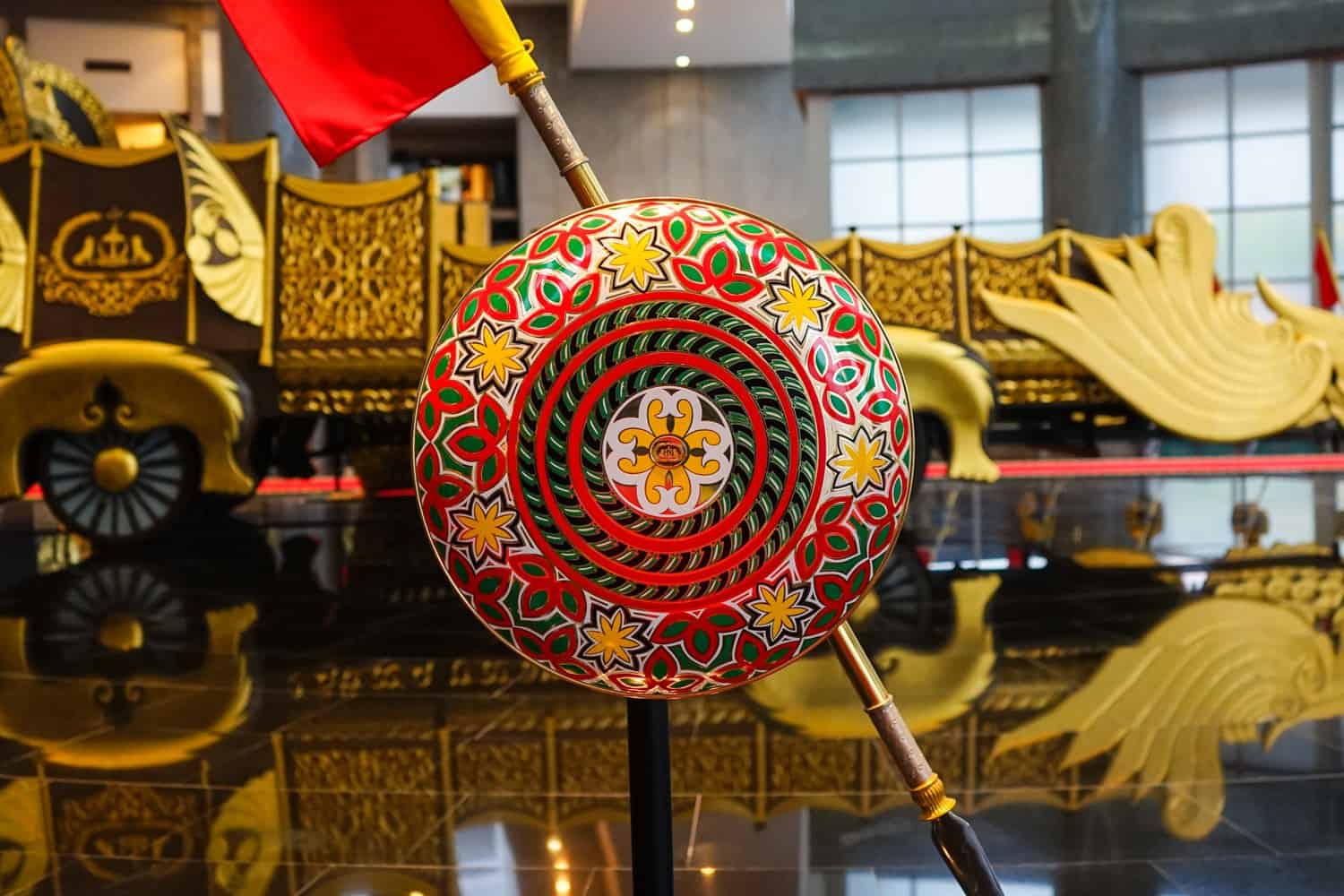
Our next stop of the day was the Royal Regalia Museum, which was free to enter. This bizarre place is home to a vast number of extravagant gifts that the sultan has received from heads of state from around the world. You couldn’t take photos inside the the museum, unfortunately, so we took a couple of snaps of the golden chariot in the entrance, then wandered in.
The museum covers the life of the sultan, from birth to his coronation to the present day, then branches off into the collection of gifts he’s received over the years. It was interesting to see which countries had gifted him the most lavish presents, and which had presented him with things that looked, um, a little bit lame in comparison.
We spent two hours inside the museum and left feeling as though we had a better understanding of the sultan, so I’d recommend heading there if you find yourself in Brunei.
Not wanting to run out of things to see on our very first day (which is perhaps your first indication of how much the city has to offer), we decided to head back to our guesthouse.
In a country where oil and gas money subsidise the cost of petrol, Brunei is a country where almost everybody drives — it’s common for households to have as many as four cars. As we didn’t have our own transport, we opted to do as the few carless locals do and take the bus back to our guesthouse. It was inexpensive at 1 BND ($0.75) for a 15-minute ride.
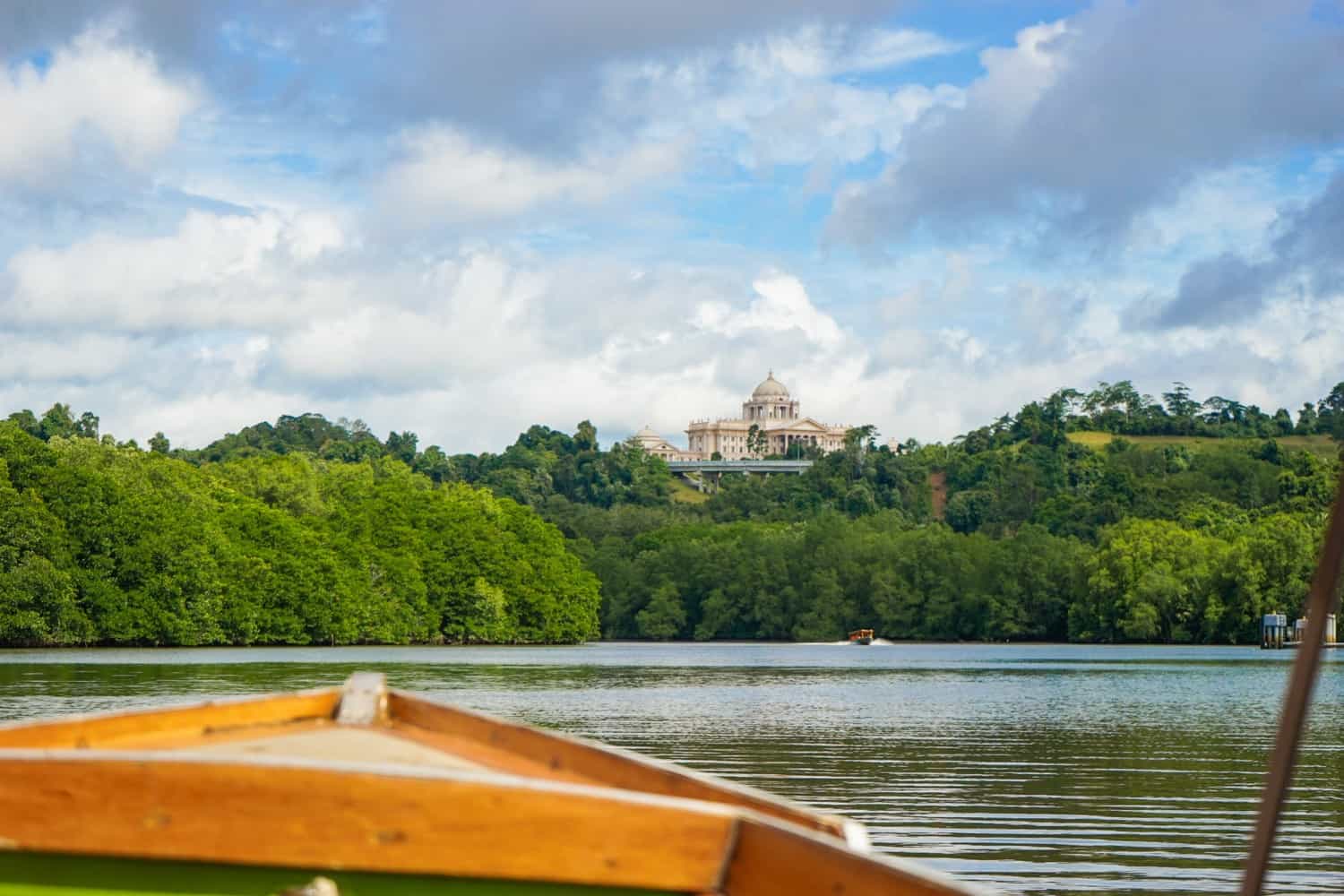
The following morning, I had one activity in mind: to head out on the water.
Bandar Seri Begawan is home to a population of proboscis monkeys, which are only found on the island of Borneo. I’ve always wanted to hang out with these unusual-looking animals, so when I found out you could hire a boat to take you to see them, I was up early and walking into town.
I mentioned above that practically everybody in Brunei drives, and that driving is seen as the only way to get around. We rarely saw anybody walking into the city, and I soon learned why when Dave and I attempted the hour-long trek into the centre of Bandar Seri Begawan.
Within two minutes of setting out, a car pulled over and a smiling middle-aged woman waved us over.
“Get in! Get in!”
We piled inside, thanking her profusely.
“Welcome to Brunei!” she said. “Where are you going? Where can I take you?”
Dave and I communicated with each other using our eyes to try and work out if we were in a taxi. I’d read that Brunei has less than 50 across the country and that it’s super-rare to see any driving around. After all, there isn’t much point in operating as a taxi when most of the locals drive themselves.
When she dropped us off at the waterfront, we offered her money for petrol and she laughed, eventually accepting a few Bruneian dollars for the ride. That experience coupled with the wonderful hospitality we’d been shown by Maya had me bowled over by the kindness of the locals.
Of course, given that I’m bisexual, it also had me wondering if people would have been quite so welcoming if I hadn’t been travelling in the country with my boyfriend.
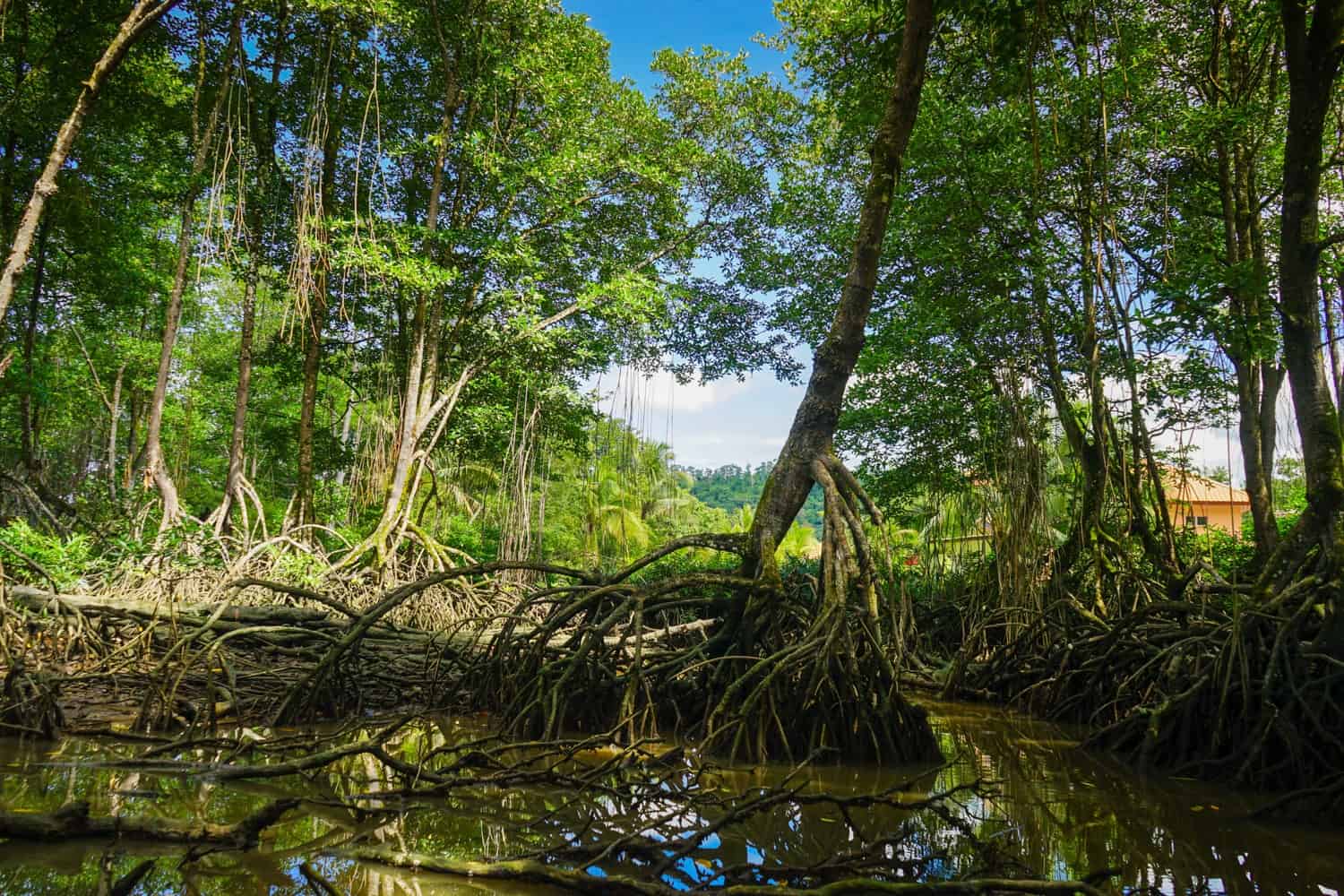
We approached a local guy on the jetty and asked how much it would cost to spend a couple of hours on the water. We wanted to catch a sighting of the proboscis monkeys, but also take a look at Kampong Ayer: a series of floating villages where three per-cent of Bruneians live their lives. After negotiating the price down to 30 BND ($22), we clambered into his boat and put on our life jackets.
Minutes later, we were racing towards the mangroves; the wind causing my eyes to water. I wasn’t holding out much hope for a monkey-sighting, as I knew we were roughly two hours past prime observation time, but smiled anyway. I love jungles, and spending time in them was precisely why we had chosen to travel to Borneo.
After half an hour of high-speed boating, during which we paused for a few moments to take in the view of the largest residential palace in the world (#Brunei), we spotted a small clearing through the mangroves, and manoeuvred our way between the roots.
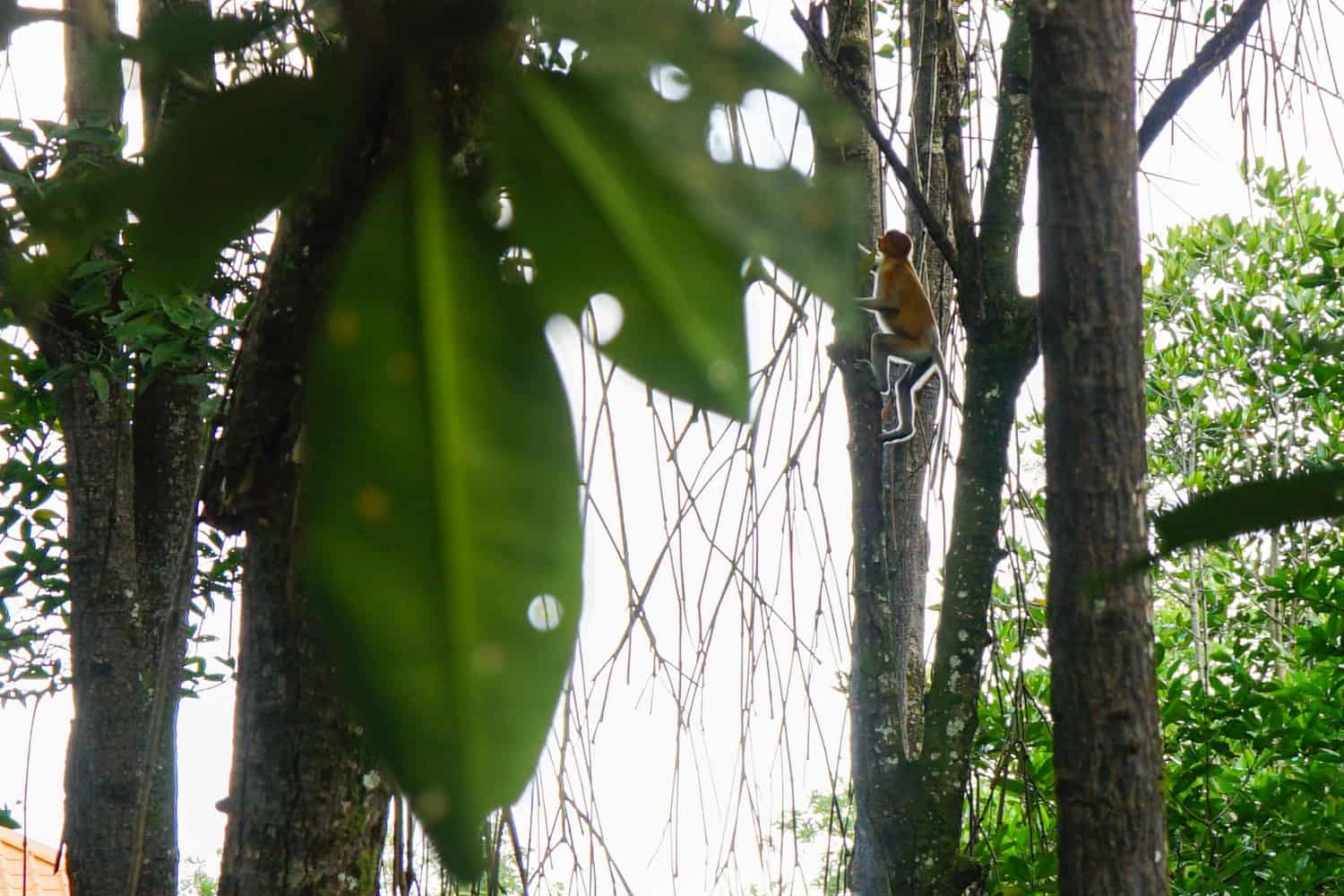
Within minutes: movement!
I couldn’t believe it.
Ahead of us, a silhouette of a proboscis monkey made its way up a distant tree trunk and caused my jaw to drop.
These days, I prefer to spend my time in the moment rather than witnessing magic from behind a camera screen. It’s a fairly poor decision to have made as a travel blogger, I’ll admit, to often have only a couple of photos to choose between rather than hundreds, but it’s one I’ve made peace with. I spent ten minutes watching the proboscis monkeys scrambling through the trees before reaching for my camera.
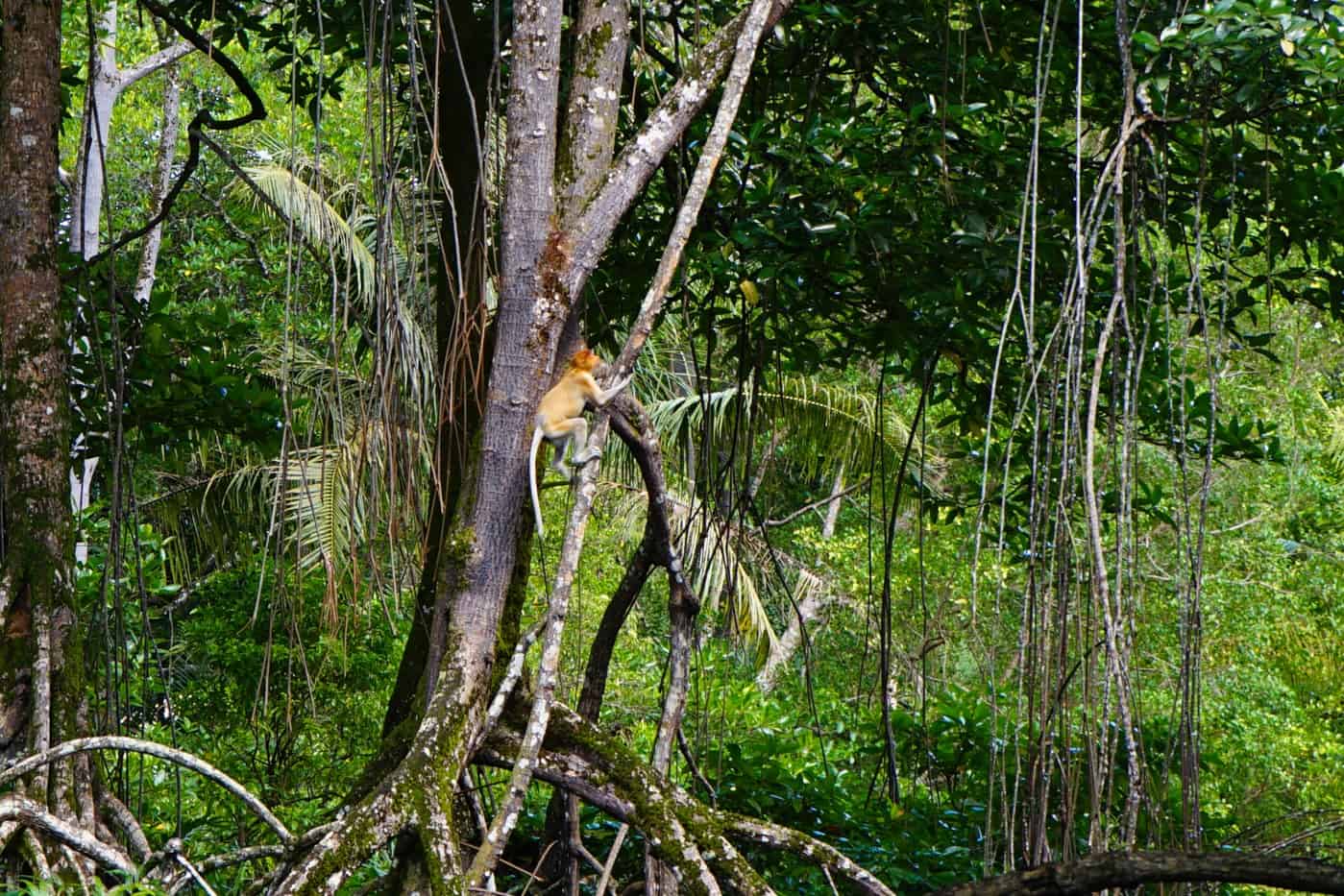
“You need a zoom lens,” our driver said, as though he could read my mind.
“Yup,” I said, frowning as I squinted at my photos.
I wasn’t too concerned, though. We were planning to travel into Malaysian Borneo after our time in Brunei and I’d read that animal encounters were far more frequent and exciting in Sabah.
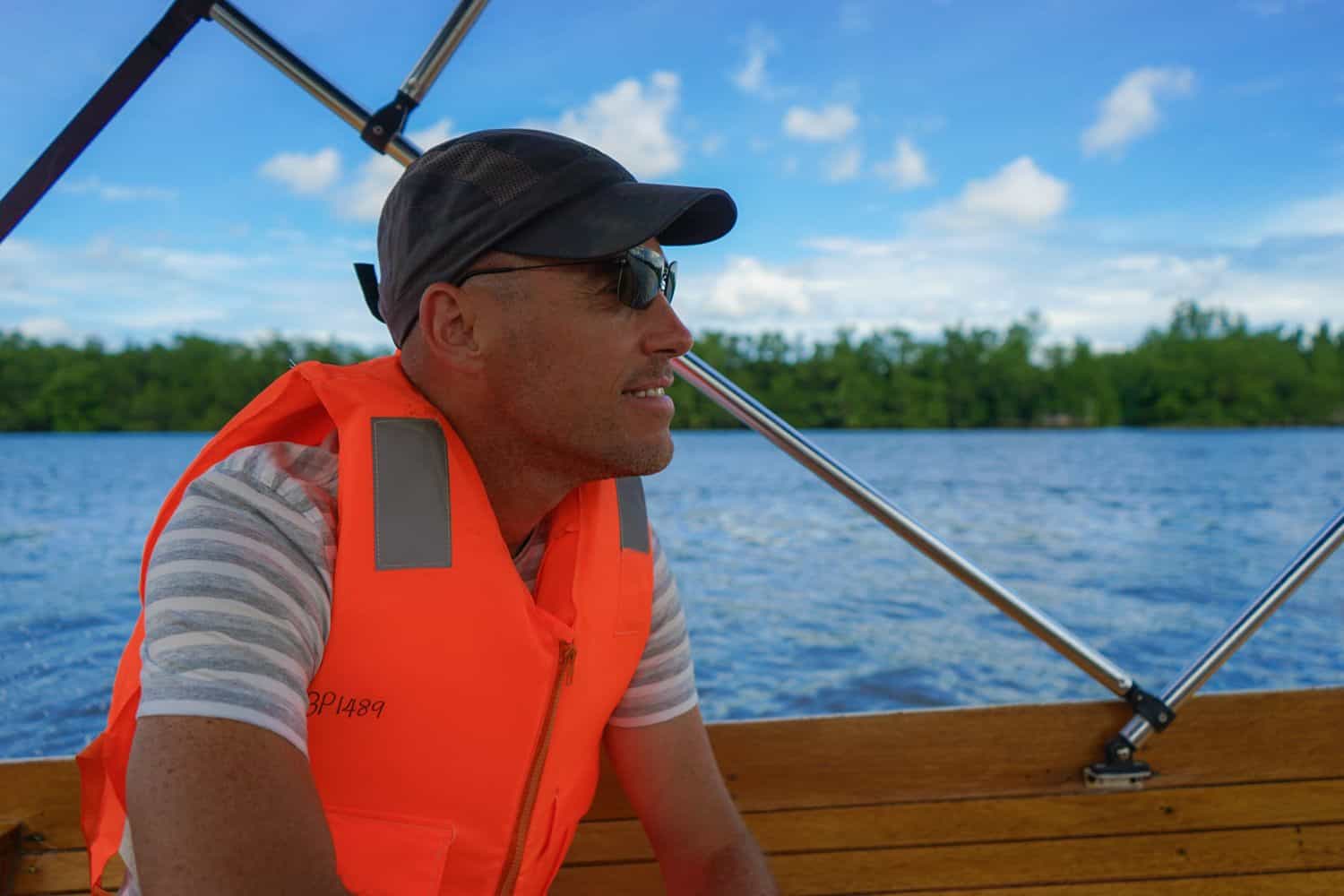
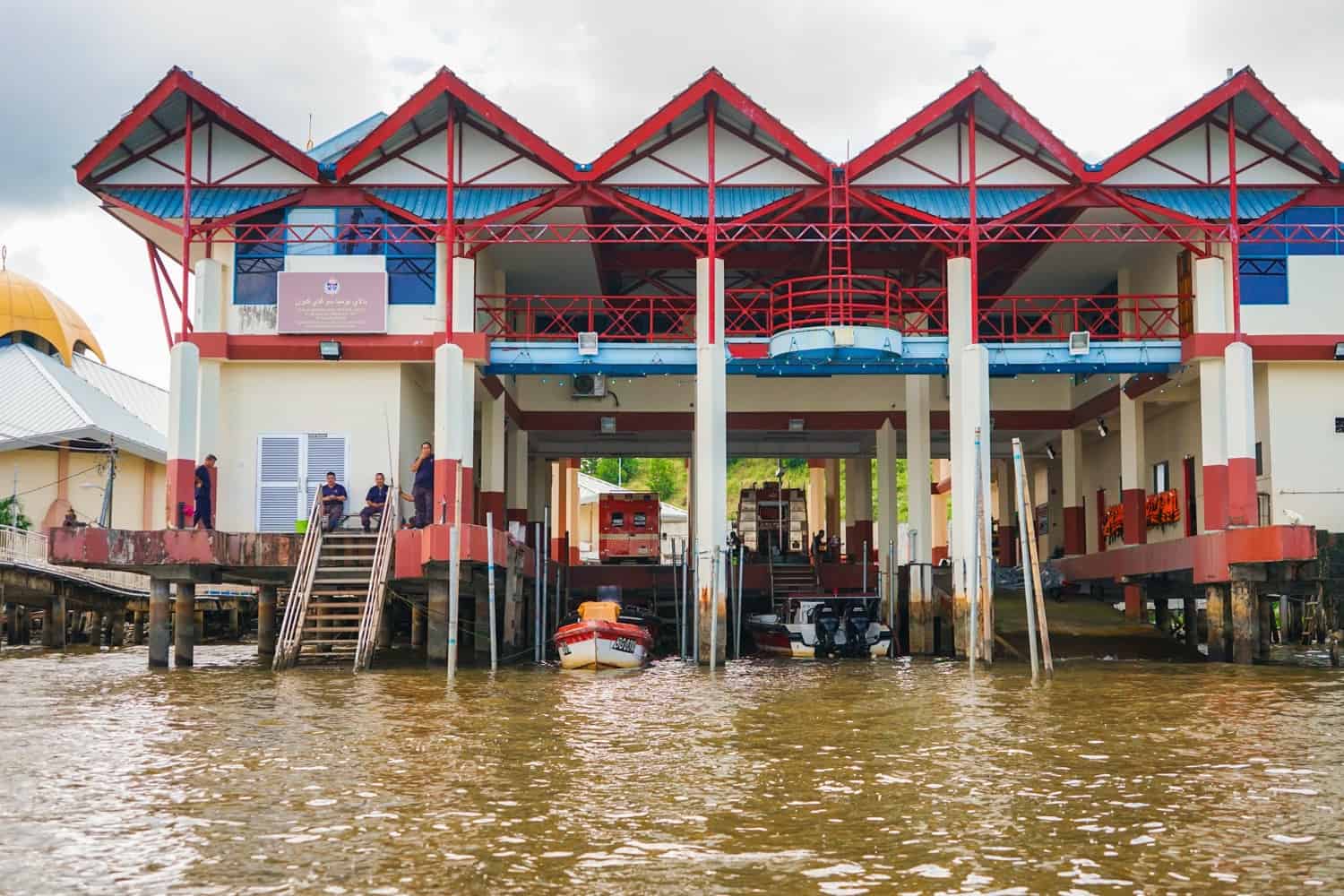
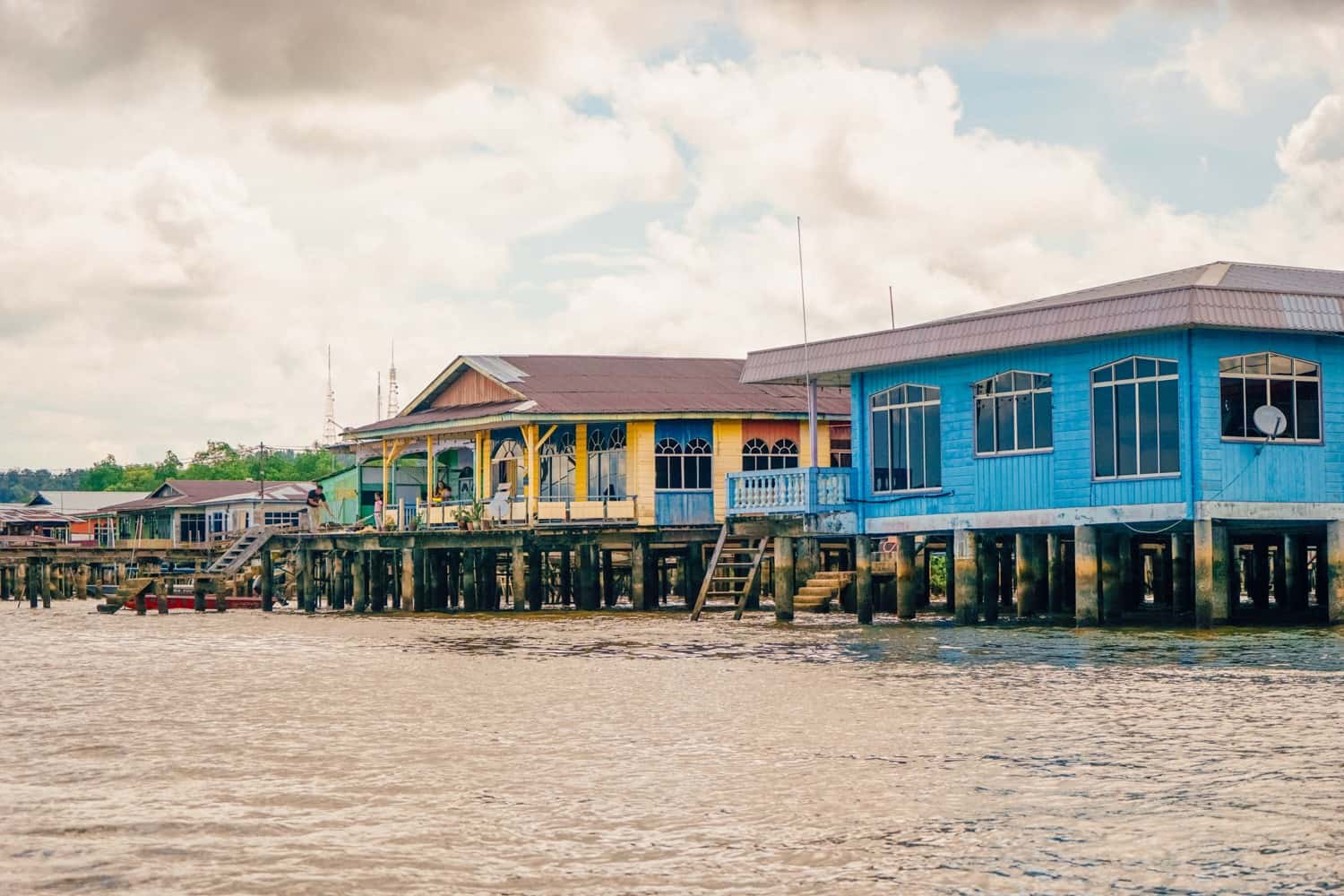
I asked our driver if he’d mind showing us around Kampong Ayer.
He’d grown up on this group of floating villages, so was able to tell us about his life on the water, pointing out the school-on-stilts that he used to attend, as well as the local police and fire stations — all of them on stilts above the river. While most people think of Kampong Ayer as a single village, it actually encompasses 42 villages on the water, stretching out for 23 miles.
This part of Brunei is over 1,000 years old and is home to a dwindling population of around 13,000. Within the villages, you’ll find 13 schools, an art gallery, a mosque, post offices, petrol stations, and even a prison. If you look on Booking, you’ll find half a dozen private rooms you can rent out in order to gain a taste of this traditional Bruneian life.
If you’re anything like me, you probably hold the misconception that these homes are primitive in nature, but residents on the water have access to electricity, air conditioning, running water, TVs, and the internet. Some of Bandar Seri Begawan’s wealthy residents choose to live on the water, and you’ll see their luxury cars parked up on the banks beside the river. And yet, Kampong Ayer is also home to a population of undocumented immigrants and poverty is rife. Just like any other city.
You can walk along the boardwalks that connect the villages to gain a closer look at the locals’ existence, but I was content to observe from afar. I’m always hyper-conscious of intruding into the lives of locals — I know I’d hate having groups of tourists peering into my windows all day long — so always keep my distance in these situations.
We paid our driver for our 90 minutes on the river, and received a text from Maya as we clambered out of the boat. She had finished her yoga class and wondered if we wanted to grab lunch with her.
Obviously, we did.
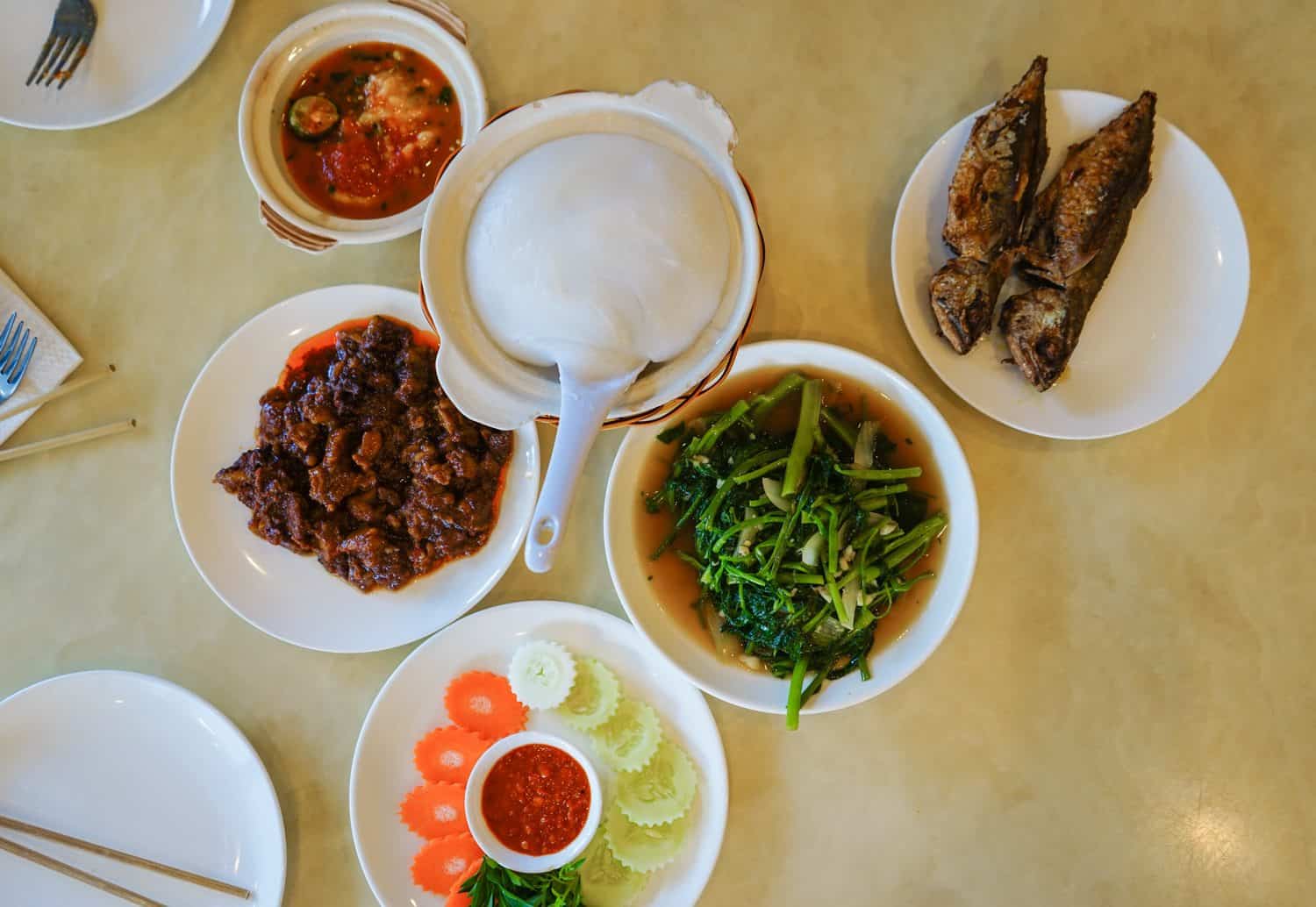
I can’t fully express how much richer Maya made our time in Brunei, so I’m disappointed she’s since closed down her guesthouse. Without her, we would have experienced greater challenges in a city with limited public transport, and wouldn’t have been able to explore as much of the country’s food scene.
She picked us up and told us she was going to drive us to one of her favourite restaurants. On the way, we discovered that her daughter is currently studying at the same university that I went to! My university was known for having one of the highest percentage of international students in the U.K., and many Bruneians choose to study in the U.K. on a full scholarship, but it still felt like a bizarre coincidence.
We pulled up outside Aminah Arif, and Maya told us she was going to introduce us to ambuyat: the national dish of Brunei.
Ambuyat is a bit of an odd meal, which was exactly why I had been so desperate to try it.
It’s made from the interior of a sago palm, and is completely tasteless. Its texture is gooey, gluey, and gloopy, and it’s eaten with a special type of fork called candas. These forks are made from two bamboo sticks that are glued together at one end and splay out to give a gap of around an inch at the other.
I have a feeling I’m not explaining this well. Here’s a photo of Dave using them.
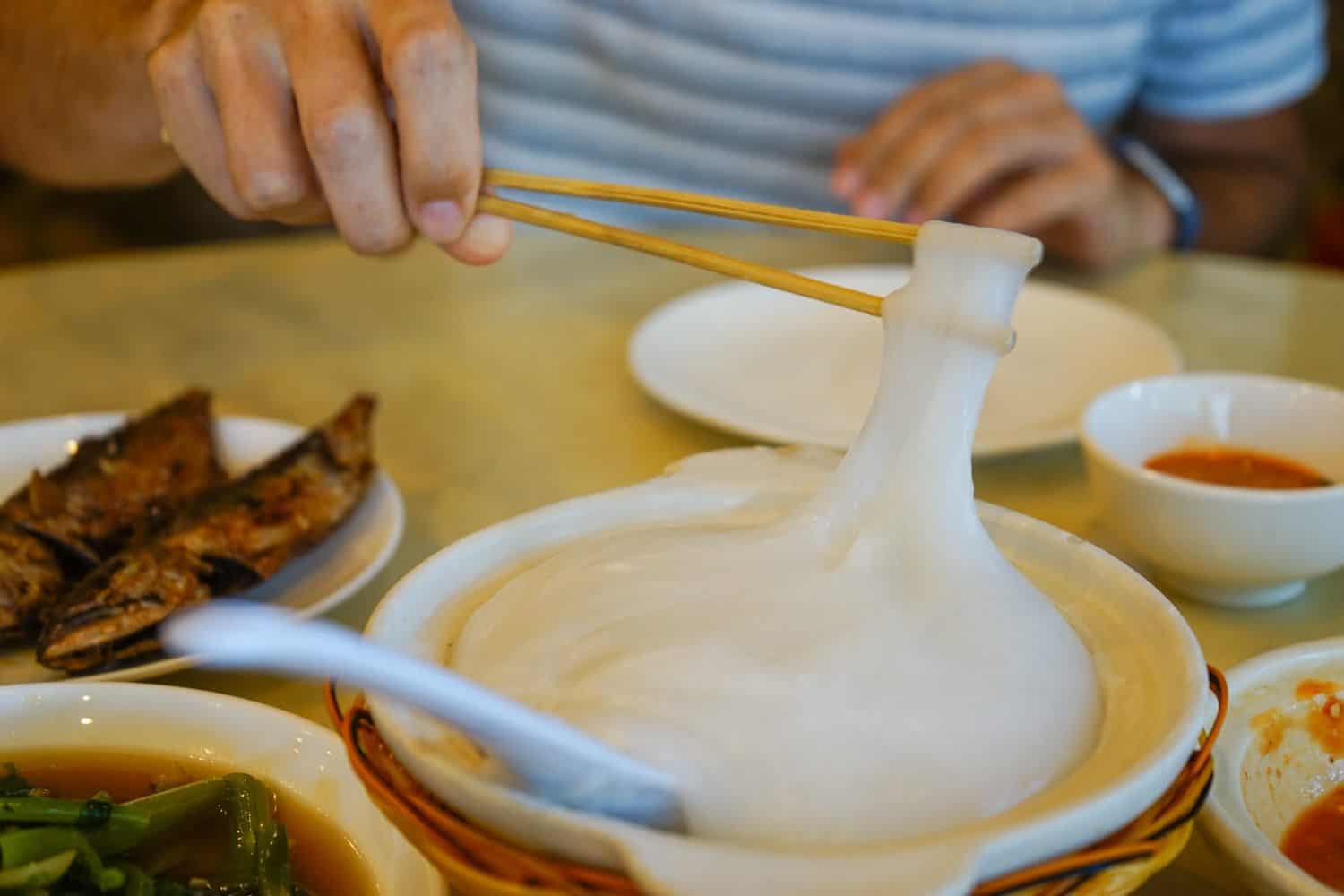
Because ambuyat has zero flavour whatsoever, it’s a boring-ass dish to eat on its own. That’s why you order a ton of dips and dishes to accompany it! We chose a fantastic sauce that was made from fermented shrimp, durian, and chilli, and it gave each mouthful an incredible spicy, sweet, and sour flavour.
To eat ambuyat, you stick your chandas into the starch and start spinning the fork in your fingers, as you would with spaghetti. Once you’ve got a mouth-sized ball on the end of your fork, flick the chandas upwards, dip the ambuyat into the sauce, then place it in your mouth. Because ambuyat has such a glue-like texture, you need to swallow the ball immediately, totally whole, as chewing achieves nothing — trust me, I tried.
We spent three hours chatting with Maya as we sampled everything, then protesting when she told us this was her treat and refused to accept our money.
Maya: totally the best.
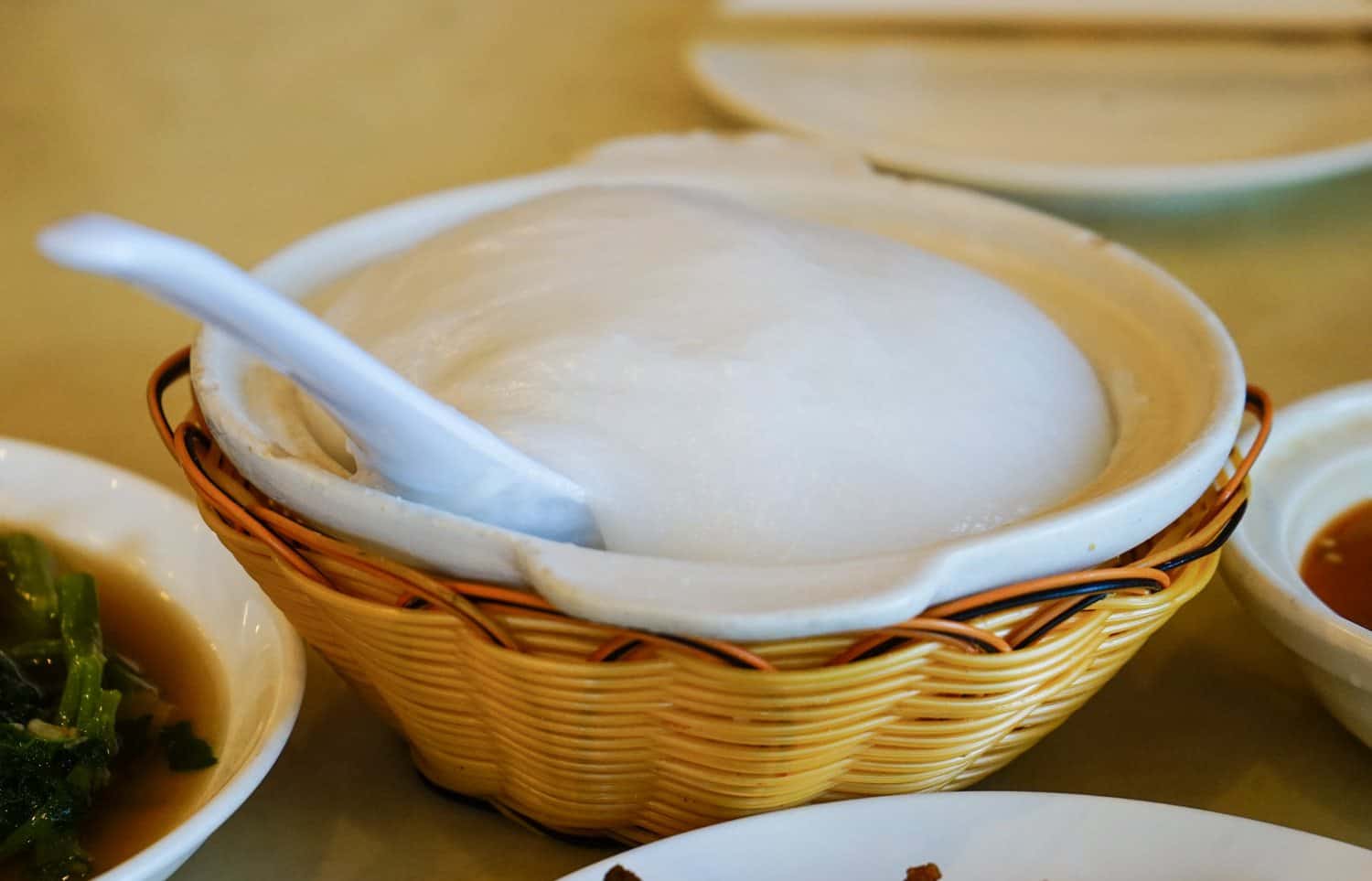
With our stomachs full, we returned to our guesthouse and pondered what to do next. We had the rest of the afternoon to explore, as well as the following day, and I realised we’d exhausted all of the touristy things to do in the country.
As in, there was nothing left to do.
Well, I mean, there were things.
I could have done the canopy walk at Ulu Temburong National Park, but everything I’d read said that the jungle was more impressive and less expensive to see in non-Bruneian Borneo, where I was going to be heading to next. I’d be spending money just for the sake of having something to do.
I could have gone SCUBA diving, too, but long-term readers already know I’ll spend the rest of my life writing about how I want to try it, but never actually having the courage to do so.
I could have taken a day trip out to Pantai Seri Kenangan, which is the best beach in Brunei, but the weather wasn’t conducive to sunbathing while we were there.
The rest of our time in Brunei could therefore be classified as a bit boring. For a capital city, Bandar Seri Begawan appeared to have next-to-nothing going on.
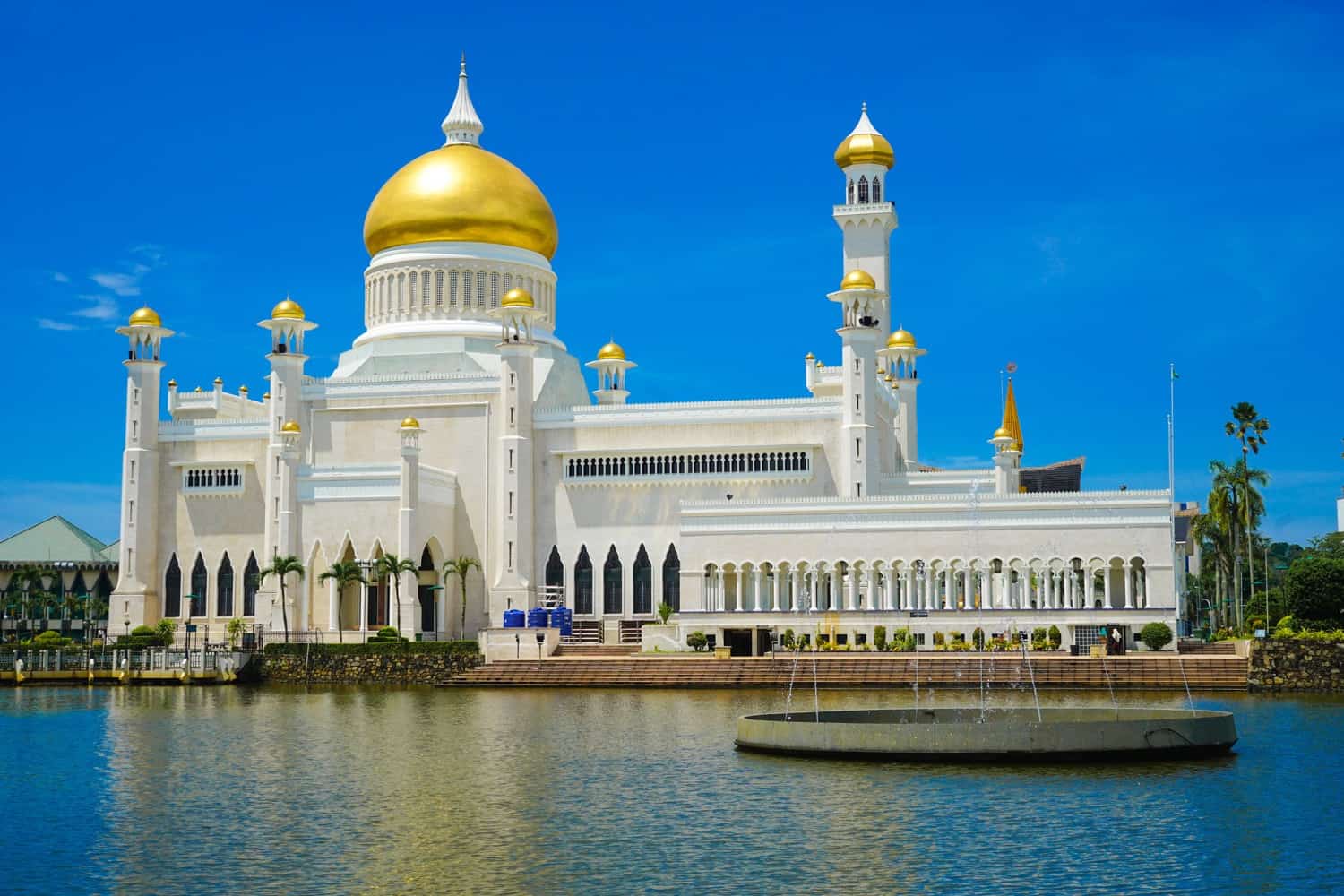
So, is Brunei Worth Visiting?
Brunei is the only country I have little desire or need to return to. I don’t feel as though there’s more left to discover as a visitor, and it’s ones of the few countries where I felt I’d experienced almost every tourist-related activity within 48 hours.
Does that mean you shouldn’t go?
Not necessarily.
I genuinely enjoyed wandering around Omar Ali Saifuddien Mosque, loved trying ambuyat and experiencing Bruneian night market culture, and was fascinated by the way of life in Kampong Ayer. They were all worthwhile experiences, and I would recommend them to anyone planning a trip there. I also experienced such an extreme level of kindness and friendliness from the locals that it really stood out to me. I felt welcomed and safe.
Despite that, you can do the majority of the tourist activities within 24 hours. All of them within a couple of days.
The contrarian in me is livid that I’m about to offer the exact same recommendation as I’d read before arriving in Brunei.
You should visit Brunei if you want to visit every country in the world. You should visit Brunei if you find yourself passing through on a layover or when travelling in Borneo. You should visit Brunei if you want to see what one of the least visited countries in Asia is like. You should visit Brunei if it sounds interesting to you.
But, uh, you probably shouldn’t spend more than a couple of days there.
It turns out it does get pretty boring after all.
Would you make the effort to go to Brunei?
Related Posts on Brunei and Borneo
🇧🇳 How Much Does it Cost to Travel in Brunei?
🚍 How to Get From Brunei to Kota Kinabalu
🍜 Where to Eat in Kota Kinabalu
🪲 Catching Fireflies on the Kawa Kawa River

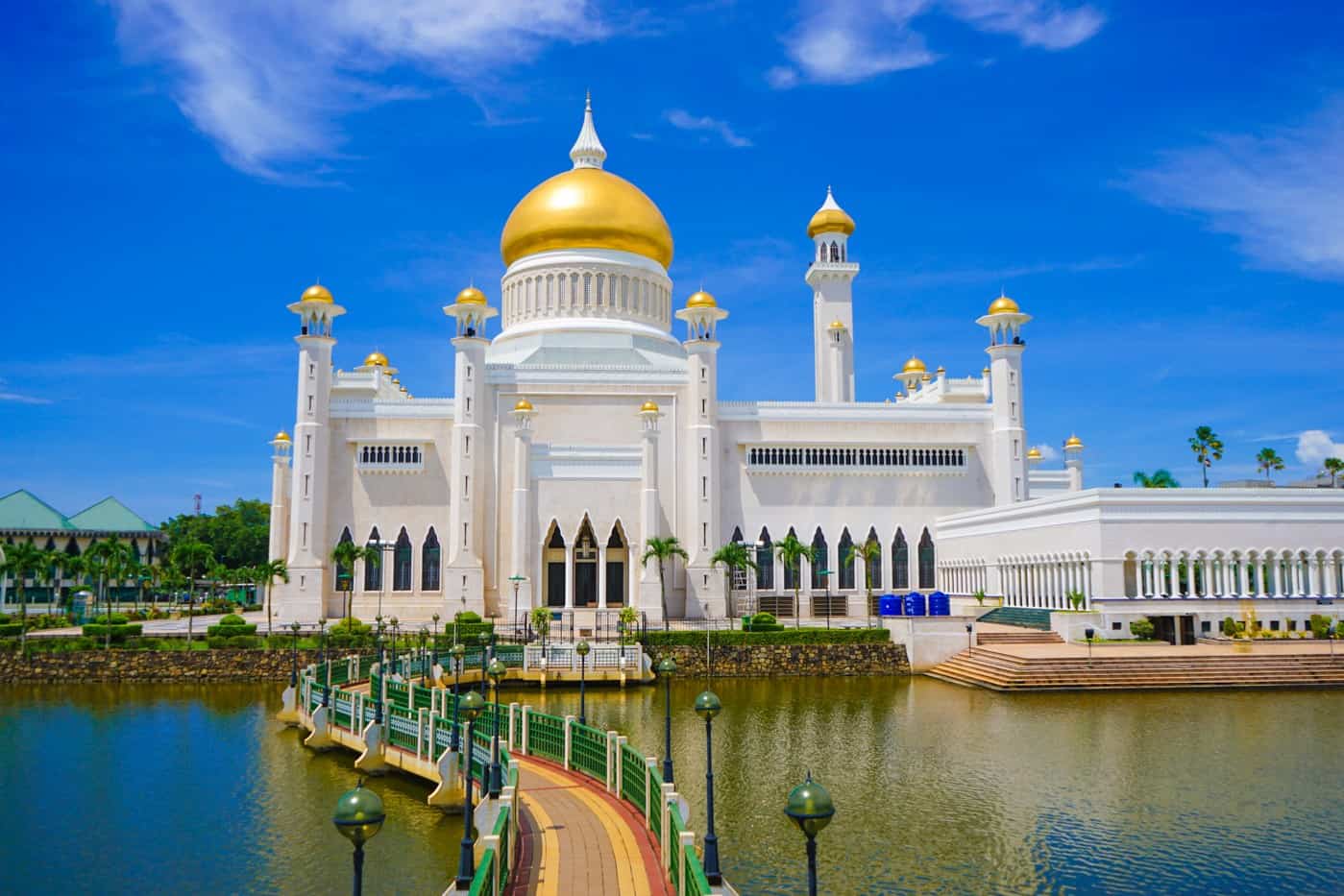
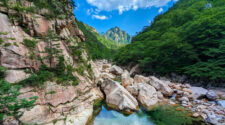
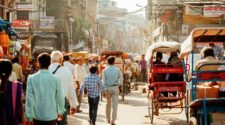
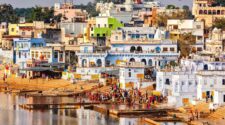
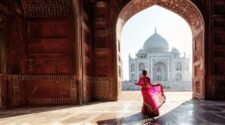
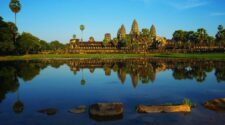
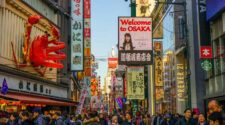
We did Borneo (Malaysian, based out of Kuching), and I loved it and wanted to go to Brunei when we went to the caves at Mulu, but just didn’t have the time. So I’m glad you’ve gone and done (as you always do) a great write up on it so I know what I missed.
And question for you – when you and Dave travel to more conservative countries like Brunei, do you wear wedding bands to avoid problems as two unmarried people staying together? I’ve heard that it’s a smart thing to do, and we did it before we were married just to be safe…
Nope, we have never worn rings. Never been asked to prove if we’re a married couple or had anyone object to us staying in the same room, and we’ve been to quite a few Islamic countries. If a hotel didn’t let us stay in the same room, we’d just book separate ones or stay in a different hotel.
Haha, I also choose to go places just because people say they’re boring! I’d definitely love to go to Brunei, even if there’s only like 2 days worth of stuff to do there. :)
High five for wanting to see a place in a different light! :-) Even though I didn’t quite manage it this time…
Cool! I’ll admit that Brunei has never been on my travel radar but sounds like a great stop. That food market sounds awesome and those monkeys are so cute! I’m glad you enjoyed your time there, even if you don’t need to go back. I think that’s okay. We don’t have to love every place and want to revisit. I also tried chicken butt in the Philippines and remember it being a big joke at the table!
Honestly, it feels so good to not feel a desperate urge to a return to a place for once. My travel wishlist is forever growing, so I’m always looking for an excuse to strike places from the list! :-)
I challenge you to visit East Timor
Already have a trip booked there for March.
Nice one. Would be really interesting to read something about it first hand as there is not much info on any travel blog.
Yeah, I haven’t been able to find much online about it so I’m super excited to get there! That’s always my favourite kind of travel destination.
Actually, the Chinese population takes up 30%~ of the country.
Good read.
I’d read that in a few places, but also that it was around 10% in others, like: https://en.wikipedia.org/wiki/Ethnic_Chinese_in_Brunei Thanks for reading!
I have to admit, despite your claims it was boring, somehow this post has made me want to visit (but maybe just for a day). Ambuyat looks so interesting and I want to try it! Hard pass on the chicken anus though.
Ha! Ambuyat, at least, is really worth trying. I wish it was available outside of Borneo so that more people would have the opportunity to try it.
Did you guys tried the Jame’ Asr Hassanil Bolkiah mosque? I read in another blog that while not as pretty as the Omar Ali Saifuddien, it is still attractive and plus it is the biggest in the country. Just an idea for an additional activity.
Yep! It was pretty nice. You can see the outside within five minutes, though, and we weren’t allowed inside.
Fascinating! I knew virtually nothing about Brunei and I think if I had looked into visiting, I probably wouldn’t have bothered because like you say, most people just say it’s boring – but you’ve actually made me interested in going! Everyone sounds so friendly too. It would be interesting to see what you would have thought if you had just gone for 2 days and not run out of things to do.
That’s so funny! Even when I came to write this post, I was expecting it to turn out super-negative, but by the end of it, I was like, oh okay, Brunei wasn’t actually that bad. Just a little boring, but as long as you visit for just a couple of days, you won’t have enough time to experience that.
Thanks for sharing, I’m always curious to know more about these least-popular countries. I don’t think I will ever go there myself as I don’t travel full time so I need to manage my itineraries well – with so many interesting places and activities in that region of the world, I guess Brunei will not fit in there ;) But I enjoyed learning more about it from your post. And respect for trying that chicken butt… ;)
Hey man, Just a suggestion. you guys should try to go to Temburong ( 4th District of Brunei ). since you said you love jungle. you will love it
Thank you! Maybe if I head back to Brunei for a second time :-)
I grew up in Brunei in the 90’s/early 2000’s, had 12 years there as an expat from the UK. I’m so happy you went and that other people are thinking of going. I know I’m bias as I had a wonderful childhood and still think of it as home but I’m happy from the sounds of it Brunei is still Brunei regardless of the law changes. I went round selling flowers as an enterprising 10 year old and got invited for a lot of cups of tea. A couple of things; you can go trekking on horseback on the beach, go to the Empire Hotel (very posh but fun if you want to splurge), wander through the jungle to waterfalls, have a night over the border in Miri if you want some local nightlife, stay in a traditional long house in Temburong. I’ve always said Brunei is the kind of place that you are either there for a weekend or a lifetime.
My husband & I visited Brunei for 5 days. We enjoyed the peacefulness & the nature of Brunei.
Thanks for the good writing. It seems Brunei has nothing going on in it after all. There is much greater mosque on it’s neighbour, Kinabalu. Better museums thorough South East Asia.
Also Kampung Ayer is nothing compared to Kapuas riverside in my city (Pontianak). We have much better food too.
Brunei will be the last country to visit, for me. Even though it’s a neighbouring country.
Yes, it’s not really a country to go out of your way to check out, but if you do get there, there’s at least a day or two’s worth of things to keep you busy.
Thanks Lauren for what you wrote about Brunei, it helped me a lot.
I like Brunei, two days are perfect.
I found an old chineese, second generation (58 years old) that drove us around half day for $ 60
No stress and he knew everything like a guide.
Only problem is that you cant have a beer when you want to but I see it like a rehab !
Tomorrow he pick us up and drive us to the airport cheaper than a taxi and he bring me a beer !
Hans
That sounds like such a great trip! I’m glad you had a nice time :-)
Thanks Lauren for sharing your experience. It sounded you have a pleasant visit after all! Brunei may not have some of the “fun” places that tourists can find in other countries for e.g. 🍻🍷or night life, but Brunei offers fun eco-tourism (if one goes beyond Bandar Seri Begawan) in addition to places which offer local (and international) delicacies and cultural experience. Brunei is a safe, peaceful and a generally clean country. The people are friendly and hospitable and that makes you feel welcomed as a tourist! How one’s visit to a place turned out to be “boring” or “pleasant”, it sometimes depends on whether you feel welcomed or unwelcomed!
It’s a pity you didn’t visit the amazing waterfall “tasik” which is about 15 mins away from town, the ulu Belalong national park in Temburong district, the Empire Hotel, the Jerudong theme park…
For those who are yet to visit Brunei, you can do a trip around Borneo…Kota Kinabalu – Brunei – Miri – Kuching – Pontianak. Every stop will give you different experience. A number of my friends after they did the Borneo experience, they shared that they appreciate Brunei being a safer, peaceful and a cleaner country.
I appreciate the details you gave about your visit. It definitely sounds like a place to visit for some people and not for some. Like you, I like to visit places that most people advise against, in the hopes of discovering something different or unique that others may have missed. I have to say, however, that I am disappointed in your views of Sharia Law, especially in its practice in a place where you were only a visitor. The reason they don’t pay taxes, have free healthcare and education, and many other liberties (that the so-called free world doesn’t even have) is directly from Sharia Law. For you to imply that Sharia Law “is never a good thing” is absolutely offensive and inconsiderate to over 2 billion of the world’s population. You may not believe in or agree with Sharia Law or certain aspects of a specific religion, but that doesn’t give you (or anyone else) the right to judge or criticize. It’s like someone saying, “Most things about Italy were great, but a majority of the people are Catholic, which is never a good thing because, you know, they’re all pedophiles and they hate gays. But I loved the food and cathedrals!” It’s offensive, ignorant, and careless.
For informational purposes, I would also like to add that Mosques are places of worship for Muslims. Their extravagance and beauty are meant to show devotion to God and love for the faith. Comparing Mosques and saying that one is more beautiful than the other is frowned upon because they are all considered “House of God.” One can absolutely have a favorite, but comparing them as if it were a competition of architecture is considered disrespectful.
All in all, I enjoyed reading about your experience in Brunei and I thank you for sharing them. I only ask that you think carefully next time before insulting an entire group of people.
Be well.
I’m queer. How can I be positive about something that states I should be murdered because of who I love?
If Catholicism resulted in Italy introducing a law where humans like me were stoned to death, then yeah, I would have the same opinion as I do with Sharia law.
Hi Lauren,
This is the first article of yours I have read, having wandered here through the glories of random links. I shall certainly read more, your style is very informative and has a pleasant, conversational tone.
I felt I must comment (I rarely do) in response to the previous politely disparaging post. Strict Sharia law is an extreme element of Islam, any attempt to justify extremism is indefensibly wrong, regardless of context or faith. I don’t have a deity, but if I did I would not trust anyone who told me to kill for that deity, that is their own agenda speaking. Similarly, as a non-Muslim it is totally acceptable to consider Mosques in terms of their aesthetic qualities. I suppose I would be assumed to be Christian by default; I’m not, but I adore Christian churches, especially York Minster. They are often beautiful and I’m in awe of what we can achieve, that’s not disrespectful to a faith I have no interest in or interaction with.
Anyway, more power to your elbow, Lauren, I’m off to browse your archive.
Peace xx
“Sharia” only means “law”. It is not the problem. The problem is what some countries make of a simple arabic word.
You could have simply boycotted the place this said, instead of spending money in a country without basic human rights.
I don’t believe in travel boycotts — if I did, I wouldn’t be able to visit anywhere. All countries are unethical in some way. I wouldn’t even be able to spend time in my own home country! The places that I visited in Brunei were locally-run establishments — locals are not their governments.
Hi Lauren,
This is the first article of yours I have read, having wandered here through the glories of random links. I shall certainly read more, your style is very informative and has a pleasant, conversational tone.
I felt I must comment (I rarely do) in response to the previous politely disparaging post. Strict Sharia law is an extreme element of Islam, any attempt to justify extremism is indefensibly wrong, regardless of context or faith. I don’t have a deity, but if I did I would not trust anyone who told me to kill for that deity, that is their own agenda speaking. Similarly, as a non-Muslim it is totally acceptable to consider Mosques in terms of their aesthetic qualities. I suppose I would be assumed to be Christian by default; I’m not, but I adore Christian churches, especially York Minster. They are often beautiful and I’m in awe of what we can achieve, that’s not disrespectful to a faith I have no interest in or interaction with.
Anyway, more power to your elbow, Lauren, I’m off to browse your archive.
Peace xx
Hi! I’m glad that you visited Brunei. :) It certainly isn’t the place for people who seeks for adventure and this is coming from a person who’s lived here for 20 years.
Even though we are lacking in terms of development, it still is a place that is close to my heart. When the government provide all these free stuff they’re forsaking development / infrastructure (or at least that wasn’t their priority). This is probably why it’s terribly boring here. However, I still wouldn’t leave this place. It’s probably difficult for people to fathom why but this country I call home is far more than what is said on the news.
I can’t say how life is like for queer people here since I’m not one. But my best friend is. She loves Brunei with her entirety. Of course that doesn’t speak for all the queer people. And I certainly do not agree with how Chinese are not being treated as one of us. Or how low-skilled immigrants are treated by some locals. These are some social problems that we have. But it’s still a beautiful place to me.
I’d like to end this message with how I’ve learned to come to love my country. I wasn’t a patriot. I was liberal than most people my age when I was younger due to being exposed to western laws and media. So I disagreed with a lot of things done here. There was this instance in my life where I visited the rehabilitation centre for drug addicts. This one staff who was in charge of touring us really spoke to me when he teared up over how though there are people on death rows the Sultan never passed for them to be executed. The last execution was in 1950s. Then there was another instance, my mom was diagnosed with cancer and we didn’t have to pay a single cent for her treatment. If we had to we probably wouldn’t have been able to afford it since I don’t come from a privileged family. Where healthcare is scarce and a luxury at some places I am eternally grateful for being born here.
OKAY IM PROBABLY RAMBLING on why I love this country but yeah just an insight.
Kind regrads,
Nazihah
What an ignorant idiot. Sharia laws should be implemented as they are so beneficial for societal stability and Human rights. Imagine living somewhere where there is nothing wrong with being gay. What a disgraceful violation of human rights. Sharia is so lenient. It simply allows Muslims to be Muslims and non Muslims to be non Muslims privately. But of course, westerners want Muslims to be nuked. Homosexuality should obviously be punished with stoning;. A baby whom hasn’t been manipulated by the west could tell you as much.
You know, in my experience, I’ve found the people who are most disgusted by LGBTQ+ humans are those who secretly wish they had the freedom to explore that side of themselves. I hope one day you’ll be able to get the opportunity to do so 💜
Youre so disgusting